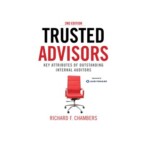
The Timeless Traits of Trusted Advisors Will Prevail in the Age of AI
June 25, 2024
5 Ways CAEs Can Effect Organizational Success
July 16, 2024During my time as CEO of The IIA, I was often asked by those within the internal audit profession, “What keeps you up at night?” My answer often surprised them: One of the things I worried about most was the prospect of a high-profile ethical lapse by a member of our profession. Why? Because it could tarnish us all.
For the most part, we have been fortunate. But lapses do happen, and they inevitably get the attention of the media. On those rare occasions, someone likely wonders aloud, “Who is watching the internal auditors?” Thankfully, no cases in recent years have been devastating to our collective reputation. However, a recent incident does remind us that our professional standing can be fragile.
Headlines out of Uganda recently identified a 33-year-old internal auditor who is facing charges of embezzling the equivalent of $45K USD from a leading Ugandan manufacturing and transport company. It should be noted that she has pleaded not guilty, and we should all presume her innocence until proven otherwise.
Over the years, there have been allegations of other serious legal breaches by internal auditors. In 2018, I wrote about the actions of Andrew Skelton, a former senior internal auditor at Morrisons, one of the U.K.’s largest and oldest supermarket chains. The facts involving Skelton’s misdeeds were well-documented. He was found guilty of stealing and then illegally sharing the banking, salary and national insurance information of nearly 10,000 Morrisons employees. For his actions, Skelton received an eight-year prison sentence.
As I noted at the time, “It’s hard to fathom the scope of Skelton’s betrayal, not just to his employer and former colleagues, but to his profession. His actions are light years from the high ideals all internal auditors must live up to. Indeed, when the profession takes on the mantel of ethical overseer, it must be held to the highest standards and operate beyond reproach.”
While internal auditor transgressions like the ones in Uganda and the UK make headlines in the main stream press, there are others that fly under the radar. For example, there have been several instances in recent years where chief audit executives and other internal auditors have been charged with helping their companies conceal criminal activity. The most common convictions are those where internal auditors helped conceal violations of the Foreign Corrupt Practices Act. While these convictions may not attract the same level of media attention as examples of outright theft or corruption, they destroy careers and are daggers to the heart of our reputation nonetheless.
As internal audit practitioners, we tell ourselves we are a breed apart. Often misunderstood and often underappreciated, internal auditors help protect organizations from myriad threats, both internal and external. And in our role of guardians of trust, we provide assurance to help businesses operate efficiently, effectively and ethically.
It’s not hard to wax philosophic for those of us who have a true appreciation and love for what we do. In a previous blog, I identified seven attributes I believe internal audit leaders should model as a standard for ethical behavior. These are attributes that all internal auditors, not just CAEs, should aspire to:
Honesty. This is the bedrock upon which all other ethical behavior is built.
Courage. Honesty is not always easy. It’s not hard knowing the right thing to do, but it takes courage to actually do it. For an example of true courage, we need look no further than Cynthia Cooper, who blew the whistle at WorldCom despite real professional and personal danger.
Accountability. We must be constantly vigilant in ensuring full accountability for our actions. Nothing can damage one’s ethical reputation more than the perception that we demand behavior we don’t model.
Empathy. Honesty must be tempered by the realization that we work with people who are driven by hopes, dreams and feelings. That means we must understand the impact of our actions. We can accomplish our job without compromise while maintaining respect and empathy for others.
Trustworthiness. As the word implies, we must be worthy of others’ trust. But that trust can be built only on a track record of ethical behavior and accountability.
Respect. This is the payoff for acting honestly, courageously and empathetically. If you reach this level, then those around you will instinctively turn to you as an ideal of ethical behavior.
Vision. This may be the hidden trait in ethics. Reacting to ethical conundrums fulfills only part of the ethical contract. It is important to keep an eye on the future and to provide honest and courageous insight in reporting how situations can be averted. Acting proactively exhibits the deepest aspect of ethics — working to ensure things go right before they can go wrong.
Frankly, these attributes are not particularly difficult to model for truly professional internal auditors. That is why it is so appalling, painful and unforgivable when any individual in the profession betrays these ideals for personal gain or spite.
Let’s not let the actions of either the accused internal auditor in Uganda, Andrew Skelton, or any other misguided member of our profession tarnish the best of who we are. Instead, let us rededicate ourselves to being guardians of trust in our organizations.




I welcome your comments via LinkedIn or Twitter (@rfchambers).